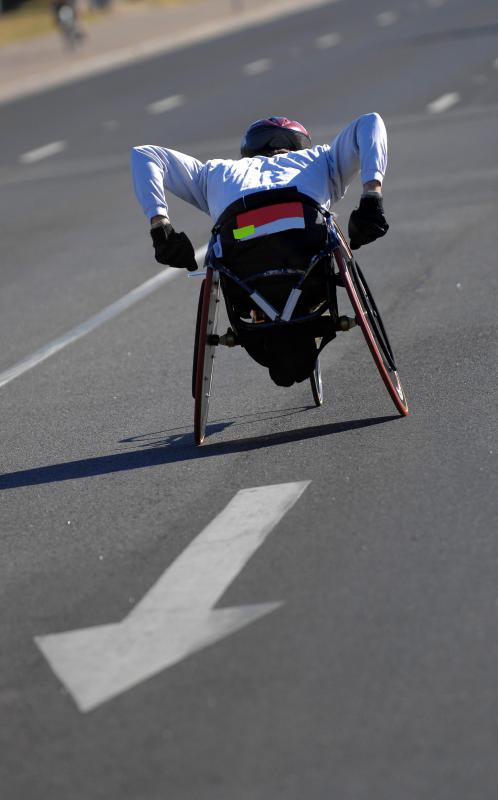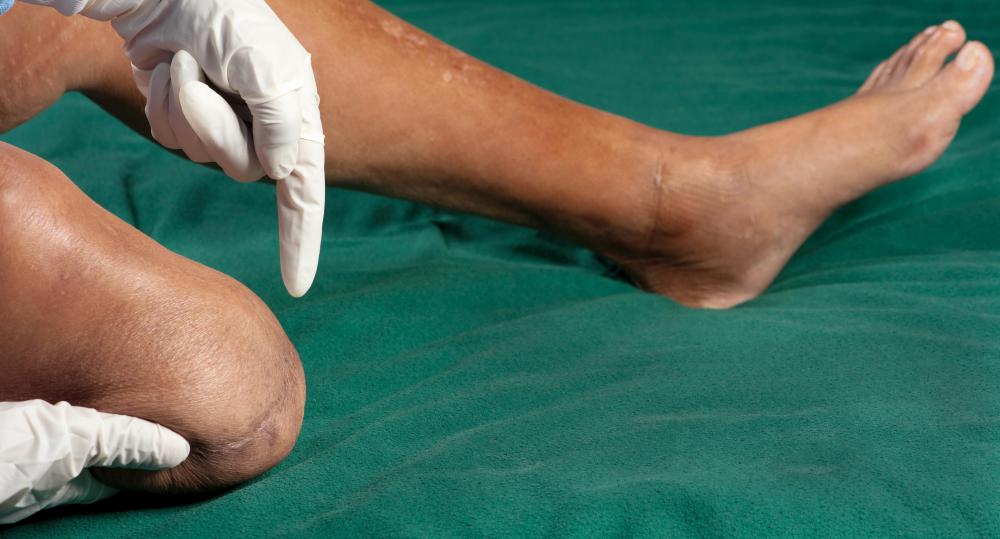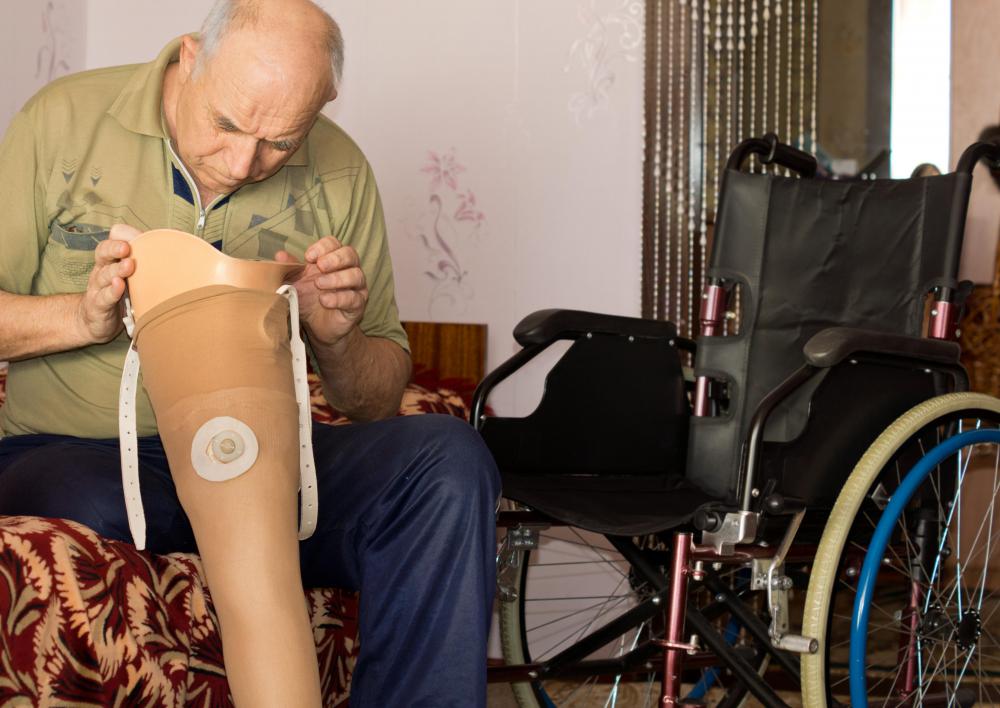At TheHealthBoard, we're committed to delivering accurate, trustworthy information. Our expert-authored content is rigorously fact-checked and sourced from credible authorities. Discover how we uphold the highest standards in providing you with reliable knowledge.
What is an Amputation?
An amputation is the removal of a body extremity, most often referring to the loss of an arm, leg, finger or toe. The removal is most often done through surgery in response to a trauma, disease or infection. In addition to removing diseased tissue, the amputation of a limb may also relieve pain. A congenital amputation occurs at birth and is the term used when someone is born without a limb.
When an amputation is performed, the surgeon cuts the skin around the part to be amputated and removes the part. After the limb in question is removed, the remaining bone is smoothed. The leftover flap of skin, muscle and connective tissue are used to cover the bone, which is then surgically stitched and heals into what is commonly referred to as a “stump.”
The amount of time spent on reconstruction varies based on which body part is being amputated. Those who lose an arm or leg can expect a more detailed reconstruction. Special detail is given to prepare their stump for a possible prosthesis.

An amputation is always a last resort for doctors who have tried other methods to save the limb in question. Rehabilitation, reconstructive surgery and rapid treatment with blood and plasma have made amputations less common than in the past. The most common causes of an amputation will vary depending on the country. Countries with soldiers in battle will have significantly higher amputation rates because of attack, whereas other countries will have more amputations that are caused by diseases.

The most common diseases or conditions that may lead to an amputation are diabetes and sepsis. Additionally, hardening of the arteries, arterial embolism, gangrene, frostbite, Raynaud’s disease and Buerger’s disease are linked to causing amputations. It is also important to note that amputation is a major surgery and holds all of the same dangers as other major surgeries do, such as blood loss, receiving anesthesia and possible blood clots.

In addition to the obvious physical limitations, amputees may also experience emotional trauma surrounding their amputation. Many amputees experience a common side effect known as “a phantom limb.” Those who have had an amputation experience itching, aching or burning on limbs that are no longer there. Although the phantom limb or phantom pain may be uncomfortable, it can be beneficial if an amputee chooses to use a prosthesis. Some amputees start working with a prosthesis as soon as two weeks after their surgery.
AS FEATURED ON:
AS FEATURED ON:














Discussion Comments
This is a common issue with so many of our brave military men and women so I have been grateful for the prosthetics that have been created to help them regain more mobility back.
I raised money for a charity once by running a race and this charity helped veterans learn to use their prosthesis in fun ways such as snow skiing. It was incredibly rewarding.
I knew someone that battled diabetes for many years and they ended up having to have part of their feet amputated!
Now I have another relative fighting diabetes and I hated the idea that they might have to lose their limbs, but I found diabetes often can be greatly controlled via diet and exercise so now I am hopeful that he can do more to help himself out (though sometimes diet and exercise regimes can be very tough to change or start).
I also had a teammate that had a part of their finger amputated actually in a weight room accident with a weight falling on the tip of her finger. Luckily it was just small enough to not seem to affect her physically and psychologically
I think it helped that we played soccer and not basketball or other handed sport!
After an untreated infection led to gangrene in his feet, my brother had to have them amputated. Since gangrene can spread through the body, it can lead to deadly sepsis. The reason for the amputation was to prevent any complications.
His surgeon made sure to remove all of the dead tissue. He also tried to leave as much healthy tissue behind as he could. If he had left dead tissue behind, the wound would not have healed properly.
Starting near the injury, the surgeon checked for a pulse. He also checked the tissue’s temperature near the planned incision site. This helped him know just where to make the cut.
I had an uncle who got stranded while ice fishing. His car broke down, and he was left in the cold until morning. He developed severe frostbite on his hands.
With extreme frostbite, the tendons, nerves, and blood vessels all freeze. The skin feels hard and waxy, and purple blisters appear. These are filled with blood and turn black.
My uncle could not feel his hands because his nerves were damaged. His doctor told him that he needed to have them amputated, because if he did nothing, they would possibly fall off. Since they were no good to him in their condition, he had them amputated.
At the age of 23, my friend had to have her feet and hands amputated. For a long time after the incident, she wished that she had died. She was very bitter, and understandably so.
Her condition started with a bacterial infection. The antibiotics prescribed by her doctor did not help, and the infection led to sepsis, which made the blood vessels in both her feet and hands shut down. Because of this, the tissue died, and she had to have the extremities removed.
Today, she has learned to work with her prosthetic hands and feet to the point that she can do basically everything she did before the amputation. She is glad to be alive now that she has her mobility back.
I watched a television show about a man who had his leg amputated but still felt a lot of pain in his phantom limb. The doctors were seeking a way to relieve him, and they came up with a simple solution that worked.
They placed a mirror in front of the man. They told him to look in the mirror whenever he experienced pain in the phantom limb. He did, and his mind started to coincide with his body. His brain seemed to understand that pain in that area was impossible, and it began to go away. If he felt it coming on again, he just glanced in the mirror, and it would disappear.
We have a friend who was doing some woodworking and got his hand too close to a piece of equipment and lost his thumb.
Until you lose a part of your body like this, you have no idea how much you depend on it. Even though losing a thumb would be much easier to deal with than losing an arm or a leg, there are still many adjustments that have to be made.
Not only are you faced with the obvious physical challenges, but you also have to put up with people looking at you in a strange way. Most people won't ask you what happened, but you know they are curious and want to know how something like that happened.
One of my good friends was in a car accident when she was a teenager. She lost one of her legs from the knee down in that accident. Until recently, she got around and went everywhere on crutches.
Now she uses a motorized scooter to get around inside and outside her home. She said that because of the way her limb was severed, that she was not able to have a prosthesis done.
She is used to people staring at her and wondering what happened. Even though she has lived most of her life with the effects of this injury, she keeps a positive attitude and is one of the most encouraging people I know.
@Bhutan - I know what you mean. I also tell my children that whenever they complain that they are tired when we go to the mall or an amusement park, I always remind them of the people that are unable to walk due to their disability and would do anything to feel tired like they do.
That usually ends the complaining because my kids realize that they are complaining about something really trivial. We often take things for granted and should really be grateful for our mobility because it can be taken away in a single moment.
@Subway11 - I can’t even imagine how hard that was for your friend’s mother and her family. I do have to say that it really depends on the person, because some people that face an amputation develop a stronger will to live and often do remarkable things.
I was watching television the other day and they were featuring a man that used to be a marathon runner that got hit by a truck during a run. In fact the truck ran over both of his legs.
The doctors told him that he would never walk again and because of the accident he lost both of his legs. A year later, not only did he walk again but was training for a 5K race with the help of his prosthetic legs. It was so inspiring and every time I don’t feel like working out, I think of this man and realize how lucky I am and I immediately go to the gym because it gives me another perspective on life.
@Wander- I just wanted to say that many people that have diabetes that has gone untreated have to have limbs removed because the area affected develops gangrene. This is what happened to my friend’s mother.
She had diabetes for a long time, but never took it seriously and little by little it really started to take effect. She was really in denial of her situation which is why it got so bad.
They had to amputate her leg and eventually she lost her sight. This caused an enormous amount of depression and she eventually succumbed to the diabetes. It was really sad, but sometimes the reality of some conditions are really too hard to bear. I think that counseling would have helped her.
@manykitties2 - I am not surprised that your friend had such a hard time with the amputation. There are lots of groups that offer support to those that are facing new amputations, no matter how big or small. There is a real stigma attached to those that are different or have disabilities in our culture. I believe that it will take a lot of work and time for that to change.
A good idea if you friend still has a difficult time dealing with the amputation is to get him to seek some counseling. Sudden changes to our physical bodies can be frightening and can have a huge impact on the way we see ourselves and how we relate to others.
Back in university I had a friend who had to have his finger amputated after he slammed it in a steel door at his factory job. The door was extremely sharp and nearly severed the entire thumb, and crushed what it didn't detach.
The doctors tried their best to save his thumb but he ended up having it amputated. He found that he was never really the same afterward. Despite it being a relatively small amputation it completely changed his life and forced him to relearn how to do many things. Plus, there was the psychological impact as well of suddenly having a very visible amputation.
Post your comments